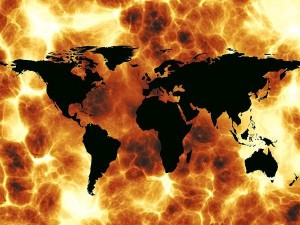 The worst humanitarian disaster in the world today is almost certainly Yemen, which is under siege and bombed every day. There is a famine, people are dying every day, and there is no let-up in sight.
The worst humanitarian disaster in the world today is almost certainly Yemen, which is under siege and bombed every day. There is a famine, people are dying every day, and there is no let-up in sight.
For years, there were terror attacks in Iraq virtually every day; bombs going off in markets, and so on. Then someone would, say, attack the London Underground and the West would go into paroxysms of grief.
We care about violence in direct proportion to how much we identify with the victims. We identify with fellow Westerners far more than we do with non-Westerners. Let there be an attack in Western Europe (not Eastern Europe) or an English-speaking nation and we cry and talk about racism and fascism and intolerance and go on and on and on.
And meanwhile Yemenis die. Iraqis die. Afghans die.
One might say “all deaths matter” but we don’t act that way. Some deaths definitely matter more than others, some violence definitely matters more than other violence. When Saudi Arabia, aided by the United States, bombs the hell out of Yemen, well, that doesn’t much matter.
When some right-wing fascist shoots up a mosque, we go into paroxysms for days.
All lives, and all deaths, are not equal, they never have been.
Which is, I guess, like saying, “The sun is hot.” Everyone knows this, we just, too often, pretend otherwise. We pretend we care about people who aren’t like us, who aren’t members of our societies or societies we identify with.
And maybe we do. A little bit. A very, little bit.
Identification is in the running for the first evil; the first sin.
Oh, it’s entirely understandable: humans are tribal. For much of history, the most dangerous animal to a human was another human, and we compete for the same resources. Our near-competitor is other humans (with insects coming a close second, ever since the agricultural revolution).
It is human to identify: We put ourselves first (my body!), our families second, our friends third, our tribe fourth, and everyone else a distance thousandth.
But much of what is human is evil or self-destructive. Much of what is human is especially evil or self-destructive when it scales to billions of people.
In a world where humans are a few million or even a few hundred million people, what we do doesn’t much matter. Oh we can and did cause ecological collapses. We can and did cause genocides. We can and did wipe out entire species (including, basically, all megafauna). We’ve always been cannibalistic locusts on two legs.
But when there are billions of us, when we live in each others pockets, and when what happens in the Amazon, the Congo, or the Arctic bounces back to effect us almost immediately, when what happens when a country like Iraq, Afghanistan, or Yemen becomes a failed state, or when a country like Saudi Arabia becomes a fantastically rich, fundamentalist state exporting its particular ideology all over the world, well, our identities are ramped up into weapons far more deadly– more so than they were when our ancestors wiped out the European aborigines, or most of the Native Americans.
Identity tells us not just who to care about, it tells us who to kill.
And we are very good at killing.
The irony is that identities are very close to arbitrary. You didn’t choose where you were born, or who your parents are, so you didn’t choose your culture or your nationality. As for religion, most people worship the religion of their parents.
We kill each other fighting over characteristics we didn’t create (you didn’t create Christianity, or Islam, or Hinduism, or, America, or Russia) and which almost none of us chose.
This is bug-fuck insane. If you change your religion, you are still you. If you change your nationality, you are still you. We are killing ourselves or identities which are, well, crazy to identify with. (This will strike most people as radical, but no, your religion or nationality is not fundamental and if you think it is, you are nuts.)
Or we divide ourselves up over frankly absurd biological characteristics: the color of our skin, or our sexual characteristics.
None of this makes any sense.
And the consequences are severe: Because we do not take care of everyone, because we are scared of each other, we treat each other badly.
The simplest and surest rule of human nature is this: People who are abused tend to become abusers. People who are treated well tend to treat other people well. Oh, this isn’t a 100 percent rule–there are always exceptions, those people who were abused and turn into saints, those who are treated well and are still bad…but overall it’s a rule that works.
Evil redounds. It doesn’t always, or even often, redound directly on those who do evil (the world would be a better and simpler place if it did), but it does hit other people.
Evil leads to more evil.
Good leads to more good.
But because someone has a different culture, or religion, or nationality, or skin color, or genitals, we think it’s ok to do them more evil, and less good. We think it’s ok to care more about the evil done to people we identify with, and care less about people we identify less with.
And in a world with billions of people, that doesn’t work. The evil we do thousands of miles away comes back to us.
Further, our identification with humans above all other life is also a problem.
If we cared about what was happening to other species, to other animals, we could have avoided the worst of climate change and environmental collapse. Because, we, humans are not yet taking it in the neck, we don’t much care; we have done, effectively, nothing.
But there is already an apocalypse among animals, with species dying every day, in the fast mass extinction in Earth’s history.
This was a warning sign.
But they’re only animals, we don’t identify with them, so, well, whatever.
In a world with billions of people, we will only have a good world, a world worth living in, and maybe even a world we even can live in, if we either identify with no one or everyone. Either we recognize that humans, and life, are a web supporting each all of us, and that our good lives require all of us, or we will create hell.
Or rather, given that climate change and ecological collapse are now irreversible to some extent, we have already created hell, it just hasn’t been completely delivered by nature yet.
Preferential identity, for us as a species, is an evil. Most religions and nationalities and ideologies, putting some people above everyone else, are evil. Perhaps they have done some good in the past. Perhaps they do some good in present. But overall they lead to evil, and cannot but lead to evil. (As most recently, nationalism did.)
No one wants to believe this, but most people identify with nationalities or religions or cultures or skin color or whatever. They identify with crap that either clearly is not them, or which is meaningless (who cares how much melanin you have?)
Until we fix this, every fix for our problems as a species will be temporary: a band-aid on a gusher.
So it has ever been.
Does it have to ever be?
The results of the work I do, like this article, are free, but food isn’t, so if you value my work, please DONATE or SUBSCRIBE.
 We live in a degraded Age. This isn’t to pretend that what came before was good in all ways, but all too often we deny the power of good. We think evil is smart, so good loses. Or we deny that good and evil even exist, claiming they are spiritual or metaphysical constructs with no impact in the world.
We live in a degraded Age. This isn’t to pretend that what came before was good in all ways, but all too often we deny the power of good. We think evil is smart, so good loses. Or we deny that good and evil even exist, claiming they are spiritual or metaphysical constructs with no impact in the world.
 The simplest decision making loop is “only do things you like.”
The simplest decision making loop is “only do things you like.” The worst humanitarian disaster in the world today is almost certainly Yemen, which is under siege and bombed every day. There is a famine, people are dying every day, and there is no let-up in sight.
The worst humanitarian disaster in the world today is almost certainly Yemen, which is under siege and bombed every day. There is a famine, people are dying every day, and there is no let-up in sight.